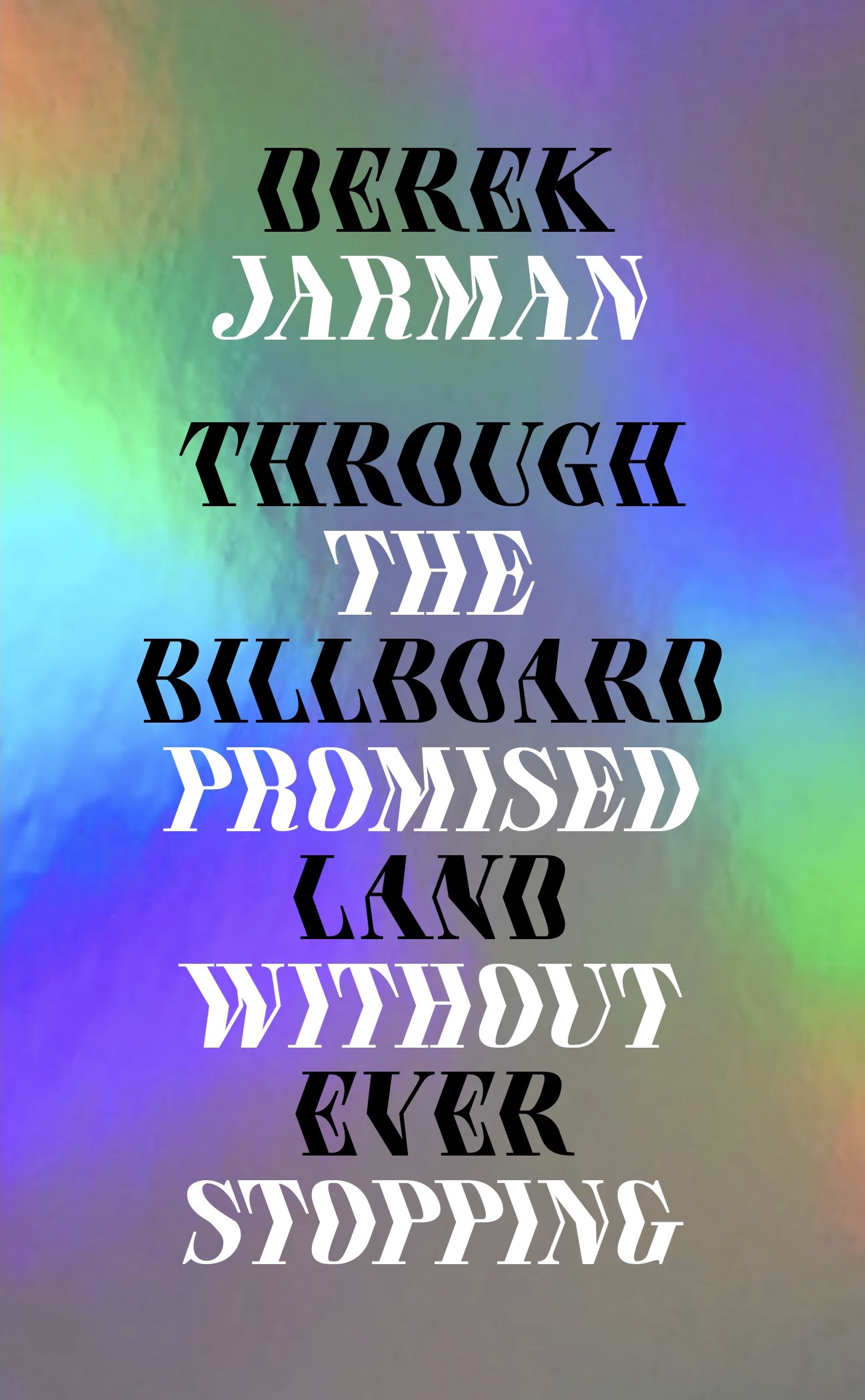Through The Billboard Promised Land Without Ever Stopping
£9.99
Derek Jarman
Published here for the very first time through our House Sparrow Press imprint, Through the Billboard Promised Land Without Ever Stopping is Derek Jarman’s only piece of narrative fiction. Written in 1971, it is a surreal, fabular, lyrical work – a literary fairytale acid-trip road movie hybrid – the energies and details of which influenced much of his later work across media. The story serves as a foundational text, laying out many of the themes, images and styling of Jarman’s work in painting, film and design whilst also being haunted by the then emerging ecological crisis in its juxtaposition of the beauty of nature with the reckless consumption of modernity.
This edition features facsimile images of the story’s handwritten drafts from Jarman’s archive, a link to an exclusive audio recording of Jarman himself reading the story in full, and is comprehensively informed by a vivid foreword from Philip Hoare, a deeply researched afterword by Jarman scholar Declan Wiffen, and a warm memoir by the artist Michael Ginsborg, a close friend of Jarman’s throughout the period of the story’s writing.
‘In this blown-away piece of Jarman magic, a fantasy / fable about how to see differently and a cornucopic visual version of the psyche, Derek Jarman casually reconstructs notions of empire, the road trip, and the mid-twentieth century journey of the soul. Trippy, light, fantastic.’ – Ali Smith
‘Derek Jarman was always an inspirational Renaissance figure, whose solidarity and commitment grounded his intense imagination. Here we can see for the first time how this remarkable conjunction of forces was present in his earliest work, and in a medium we did not associate with him – until now. Carry this volume with you as you would the key to all those doors that matter the most.’ – John Akomfrah
Description
Published here for the very first time through our House Sparrow Press imprint, Through the Billboard Promised Land Without Ever Stopping is Derek Jarman’s only piece of narrative fiction. Written in 1971, it is a surreal, fabular, lyrical work – a literary fairytale acid-trip road movie hybrid – the energies and details of which influenced much of his later work across media.
The richly poetic story, a cinematic prose quest, tracks the journey of a blind young King and his valet, disguised as beggars, who set out in no particular direction and with no particular purpose. Departing from Fargo, across the frontier of Movietown, along the Superhighway and picnicking on the Lawns of Paradise, they encounter vivid characters like Pierrot, Borgia Ginz and Topaz, an Emperor who ‘smiles with the art of mirrors’, as well as a Sphinx with ‘Silence is Golden’ written in her eyes.
The story serves as a foundational text, laying out many of the themes, images and styling of Jarman’s work in painting, film and design whilst also being haunted by the then emerging ecological crisis in its juxtaposition of the beauty of nature with the reckless consumption of modernity.
This edition features facsimile images of the story’s handwritten drafts from Jarman’s archive, a link to an exclusive audio recording of Jarman himself reading the story in full, and is comprehensively informed by a vivid foreword from Philip Hoare, a deeply researched afterword by Jarman scholar Declan Wiffen, and a warm memoir by the artist Michael Ginsborg, a close friend of Jarman’s throughout the period of the story’s writing.
‘In this blown-away piece of Jarman magic, a fantasy / fable about how to see differently and a cornucopic visual version of the psyche, Derek Jarman casually reconstructs notions of empire, the road trip, and the mid-twentieth century journey of the soul. Trippy, light, fantastic.’ – Ali Smith
‘Derek Jarman was always an inspirational Renaissance figure, whose solidarity and commitment grounded his intense imagination. Here we can see for the first time how this remarkable conjunction of forces was present in his earliest work, and in a medium we did not associate with him – until now. Carry this volume with you as you would the key to all those doors that matter the most.’ – John Akomfrah
Derek Jarman (1942-1994) is one of the most influential figures in 20th century British culture. Best known as an iconoclastic filmmaker and polemical gay activist who channeled unparalleled energy into painting, writing, gardening and all manner of cultural activity, he was one of the primary catalysts for a generation of artists and filmmakers whose work is only now being fully recognised for its dark, subversive imagination and fluidity across media. Amongst his films, Jarman is particularly recognised for Jubilee (1977), arguably the first punk movie, Caravaggio (1986), and Blue (1993), a moving memoir about his degeneration from AIDS.




